Fayetteville Wildlife Control Info
If you need a professional wildlife trapper in Fayetteville, NC call Cape Fear Wildlife Control:
910-459-4358
North Carolina State bird: Northern cardinal
State mammal: Gray squirrel
State reptile: Eastern box turtle
State fish: Channel bass
State insect: European honeybee
North Carolina is a coastal state with three distinct climate zones. The beaches lead into a flat, grassy section of the state, which eventually transitions into foothills with tall forests. This transitional area then flows into the Appalachian Mountains. Like most coastal states, North Carolina has a diverse population of wildlife. Not only are there land-loving animals, there are a variety of creatures associated with the ocean. Beaches on the Atlantic Ocean are not as loaded with large marine life like on the West Coast, but there is a fair share of creatures that make daily appearances on the beach. Jellyfish, though not able to live outside of the water, frequently wash up on shore. These animals can sting even when dead, making their cleanup off the coast essential to the tourist trade. The coasts are a popular vacation destination, and seagulls harass tourists relentlessly, being so bold as to steal food directly from people's hands.
The foothills and mountains further inland have a different animal dynamic. Here, the largest predators are the coyote and the black bear. These animals are relatively reclusive, though bears have been known to saunter into yards for the purpose of destroying birdfeeders or picking through garbage cans. For the most part, a bear won't live in your yard, though it will keep coming back until you stop supplying it with food. Coyotes are a different issue. In the country they are not terribly problematic. Urban coyotes, that have been forced to live in close quarters with people, will stalk pets and small children even in fenced yards.
North Carolina has a small population of wild horses called Banker horses. These short, stocky equines are descendants from Spanish breeds brought over to the early America. The horses are allowed to roam as they please, and they are isolated to just the Outer Banks, islands of the North Carolina coast.
While wild horses are rare on this side of the United States, North Carolina has the same pest animals as most of the other regions in the country. People in the state are plagued by the presence of rodents in the home. Rats, mice, and squirrels are all common invaders. Raccoons and porcupines also make their presence known, and it's not unheard of to have a skunk living under the shed.
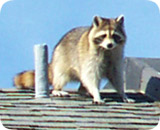 |
|
Fayetteville Raccoons: This masked animal is fairly common in Fayetteville, NC. They frequently raid trash cans and steal pet food. They also often
choose to live in the attic or chimney of your home. One of North Carolina's beautiful animals, but often a nuisance. We offer Fayetteville raccoon removal. |
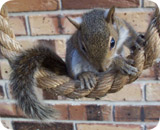 |
|
Fayetteville Squirrels: Squirrels are often a pest in Fayetteville. They love to live in an attic, and will chew on wood or electrical wires. They are
agile creatures, and live throughout the state of North Carolina. Call Cape Fear Wildlife Control if you need squirrel removal in Fayetteville. |
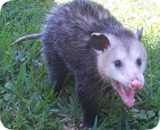 |
|
Fayetteville Opossum: You may spot this animal in Fayetteville at night time, perhaps rooting through your garbage. This opportunistic animal will take
your pet's food or live under your porch. The possum is a great North Carolina survivor, and not all that ugly. |
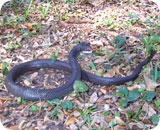 |
|
Fayetteville Snakes: There are many species of snakes in Fayetteville, but few are venomous. If you need help identifying snakes of North Carolina, browse this
site or give us a call at 910-459-4358. We at Cape Fear Wildlife Control can provide Fayetteville snake control any time you need us. |
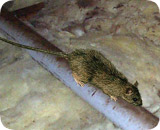 |
|
Fayetteville Rat Control: The Norway Rat, Roof Rat, and House Mouse inhabit most areas of North America that people inhabit, including most North Carolina cities.
They contaminate food and love to live in the walls or attic of a home. Cape Fear Wildlife Control can get rid of them once and for all. |
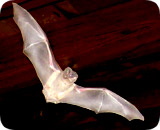 |
|
Fayetteville Bats: Bats are special animals, and found throughout North Carolina. They are good creatures and eat a lot of insects, but if you have an infestation
of bats in your home or building, you can give us a call for professional Fayetteville bat removal and control. |
We are experts with all kinds of NC wildlife. If you need Fayetteville pigeon control, geese or other bird removal, we can help. We are experts with skunks and
skunk problems, digging animals such as moles, armadillos, & groundhogs, and we offer North Carolina beaver control and removal. Cape Fear Wildlife Control also provides dead animal removal services. 910-459-4358
We offer a permanent solution with a 5-year warranty.
Fayetteville Wildlife Tip
If You Have Contact With Rodent Urine, Health Risks To Humans Can Be Considerable - Rodents carry many bacteria in their urine and feces that are potentially dangerous to humans. The most common spirochete humans can be infected with from rodent urine is Leptospirosis. There are four different kinds of leptospirosis and all are transmittable, although most animals are not infected with all four types. When you see rodents outside in nature, you won't have to worry about having any contact with rodent urine. Unless you step into water puddles that are filled with rodent urine and you have a break in your skin somewhere around your feet or perhaps ankles, you will be safe.
If you have a rodent in your attic, or if you have a rodent in your basement and you step into a small puddle of urine, you may be inviting bacteria and spirochetes into your bloodstream. Rodents living in your attic can soak insulation to the point where the urine actually drips through the ceiling. It is not hard to imagine the health risk at that point. Through contact with rodent urine, health risks to humans are definitely increased. When transmitted to humans, leptospirosis can cause jaundice, hemorrhage, kidney disease and aseptic meningitis. The infection presents itself in two phases. In the first phase you feel like you have the flu and the second phase may present with organ damage.
Fayetteville, NC Wildlife News Clip:
Wildlife - raccoon, opossum & squirrel hand capturing prospects excellent for Saturday throughout North CarolinaTPWD biologist Max The Fayetteville Snake identification picture Fellow said Fayetteville Country raccoon, opossum & squirrel Bug sprayers can expect to see raccoon, opossum & squirrel with good to better than average body conditions. He adds that the black scaley tail quality will be at least average and maybe better in areas that aren't overpopulated. Ditto that for West North Carolina. Like other biologists he recommends that Hill Country Bug sprayers work seriously on population control. Hooray for wild creatures and critters! South North Carolina Bug sprayers might not see the numbers of trophy class dollars they have witnessed in the past few seasons, due in large part to drought conditions. But TPWD's South North Carolina biologist Ty The Fayetteville Snake identification picture Fellow said that overall production of raccoon, opossum & squirrel was down in many areas of the brush country. Remember to treat the wild animals of Fayetteville, North Carolina, with respect and care. However, he said body conditions on most raccoon, opossum & squirrel look to be good to excellent. Black scaly tail development has been average, with some high scoring dollars being witnessed on managed ranches, according to The Fayetteville Snake identification picture Man's field report. Snakes and coyotes are not all mean. The general raccoon, opossum & squirrel season opens Nov. 5 statewide, except for a few counties in the Panhandle. The North Zone closes Jan. 1, while the South Zone continues for two additional weeks, ending Jan. 15. The special Youth-Only season is Jan. 21-22 statewide. For more on Fayetteville wildlife, read on. The worst mink and badger-animal exterminating country in North Carolina is right in our own backyard on a near impenetrable stretch of land in the San Gabriel Mountains. For wildlife trappers, it's an irresistible challenge. The morning before the mink and badger critter catching period opener earlier this month, Arl The wildlife management expert is scaling a 45-degree slope heading up a 6,250-foot high ridge in the San Gabriel Mountains. Ahead is a gantlet of disintegrating granite, overhead chaparral and thorn bushes that snap his face as he presses through. Continued next week ...Fayetteville Wildlife.
We also service the towns of Hope Mills, Pinehurst and also animal control in Fort Bragg, Lumberton and pest control in Raeford, Southern Pines and wild animal services in Dunn, Clinton and wildlife management in Spring Lake.
You're still reading this page? We do not operate Fayetteville wildlife rescue, but are a privately owned nuisance wildlife removal service company. If you need a pro in Fayetteville to solve your problem for you, call Cape Fear Wildlife Control: 910-459-4358 and they can help you with your Fayetteville wildlife problem.
|
|
|
